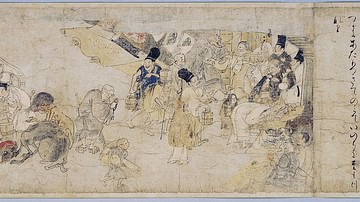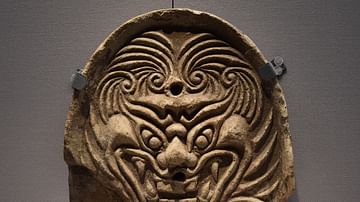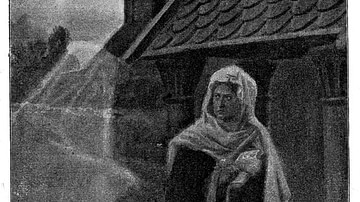Search
Did you mean: Rhodes?
Search Results

Definition
Ghosts in the Ancient World
A belief in an afterlife was central to every major civilization of the ancient world and this encouraged the recognition of the reality of ghosts as the spirits of the departed who, for one reason or another, either returned from the realm...

Article
Ghosts in Ancient China
Ghost stories were the earliest form of literature in ancient China. They were almost certainly part of a very old oral tradition before writing developed during the Shang Dynasty (1600-1046 BCE) and they continue to be popular in China today...

Article
Ghosts in Ancient Mesopotamia - Just Another Aspect of Life
Ghosts in ancient Mesopotamia were understood as a reality of life, just as they were in other civilizations of antiquity. Although the cultures of the various Mesopotamian civilizations differed between circa 5000 BCE and 651 CE, the belief...

Definition
Ghosts in Ancient Egypt
A text known as The Lay of the Harper, dating from the Middle Kingdom (2040-1782 BCE) encourages its audience to make the most of the time because death is a certainty: Make a holiday! And do not tire of playing! For no one is allowed to...

Article
Ghosts in the Middle Ages
The medieval Church informed the people's religious imagination during the Middle Ages (c. 476-1500) and the world was therefore interpreted - even by heterodox Christians - through the Church's lens. Ghosts – referred to as revenants – were...

Article
Ghosts in Ancient Japan
Ghosts (obake or yurei) appear in ancient Japanese folklore and literature, usually in moral tales designed to both warn and entertain but they were also an important element of ancestor worship. If the deceased members of a family were not...

Article
Ghosts of the Alamo - The Most Haunted Place in Texas
Toward the end of The Ballad of the Alamo (1960), recording artist Marty Robbins sings: Now the bugles are silent And there's rust on each sword And the small band of soldiers Lie asleep in the arms of the Lord. When we visited the Alamo...

Article
Norse Ghosts & Funerary Rites
In Norse belief, the soul of the deceased might wind up in any one of a number of afterlife realms. There was Valhalla, the realm of Odin where the dead warriors drank, fought, and told stories, Folkvangr ('the Field of the People'), the...

Article
Norse Ghosts & the Afterlife
The best-known vision of the Norse afterlife is that of Valhalla, the hall of the heroes where warriors chosen by the Valkyries feast with the god Odin, tell stories from their lives, and fight each other in preparation for the final battle...

Image Gallery
A Gallery of Ghosts, Demons, Spirits & Monsters
Ghosts, demons, spirits, and monsters have been haunting humanity for at least 3,500 years. The so-called “Ghost Tablet” (c. 1500 BCE), from ancient Babylon, depicts a woman leading a ghost to the underworld and amulets from earlier periods...